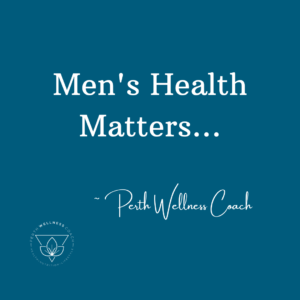11 Nov MEN’S HEALTH
 It goes without saying that, being a female, I’m not able to really understand the complexity of Men’s Health Issues.
It goes without saying that, being a female, I’m not able to really understand the complexity of Men’s Health Issues.
In saying that, I can talk about a few issues that I’ve seen in my clinic and those that I’ve researched over the course of my career.
Below are a few interesting topics that I would very much encourage you to read.
Though it may sound like a generalisation, I will say, that many Men put their health very low on the priorities list and as a result are prone to disease and mortality earlier than women.
Let me tell you up front – your health is important. When you’re healthy and in tune with your physical & mental body – you can perform in a safer, stronger and more beneficial way, holistically.
When you have a concern or notice a change in your body – have it checked. There are people who love and care about you and want you around for a very long time.
So – Let’s get to it! Let’s start with the facts and then run through steps to take so you can ensure you’re looking after your Health! I’m going to get to it and give it to you straight, many of the diseases suffered by Men are preventable. The below are the common diseases, that when looked at closely are largely developed due to lifestyle choices.
This fact sheet is not intended to scare you into Health, but rather to give you the facts straight up so you can make better decisions when planning your future. It’s important that you are able to know more about what is causing disease in Men so you can also educate those around you.
Main Health Issues
These are the facts. According to the 2016 Australia Bureau of Statistics – the top 10 causes of premature death in men in Australia are;
- Prostate Cancer
- Heart Disease
- Lung/Trachea Cancer
- Respiratory Disease
- Colon/Rectum Cancer
- Blood/Lymph Cancer
- Diabetes
- Suicide
- Dementia and Alzheimer’s
- Cerebrovascular Disease
MANY of the above are preventable; Good lifestyle choices such as eating a balanced diet, monitoring mental exhaustion, maintaining regular checkups and moderate exercise all assist with disease prevention.
What leads to disease?
Simply put – changes to your biochemistry leads your body to disease. Disease happens with cells start to change the way they are suppose to work in the body.
Why do cells change their behaviour? Changes can occur for any number of reasons. Exposure to toxins, chemicals, stress, low quality environmental factors, poor diet choices, alcohol, drugs and little to no movement.
Example;
When you drink alcohol, you might feel euphoric and feel happy and content BUT what’s actually happening in your body as the cells break this substance down is a totally different scenario all together. Alcohol is processed in the body as a toxic substance and as such the body puts all other
systems on hold in order to eliminate it from the body as quickly as possible. The more alcohol you have in your body, the slower the processes – note what happens the more intoxicated you become – your brain literally shuts down, it simply can’t perform the tasks it’s meant to.
Over time, if the body can’t eliminate it – the alcohol starts to damage the cells, the organs and the systems of the body. This ultimately leads to disease -which can manifest in any system – the digestive system, the heart, the lungs, the blood – and that’s what leads to premature death.
*Prostate Cancer
Fact – Prostate Cancer is the 3rd most common cause of cancer death in Australia. It has a 95% survival rate IF it’s discovered early enough – 95%!!!
Men can have a prostate specific antigen blood test or a rectal examination – sounds easy enough?!
Having an examine at any age is a good idea, however typically testing starts from age 40.
Symptoms of Prostate Cancer – Pain/Burning sensation during urination or ejaculation, frequent urination, blood in urine or semen, sudden erectile dysfunction, difficulty stopping or starting urination. Most men with early prostate cancer don’t have changes that they notice. Signs of prostate cancer most often show up later, as the cancer grows. So – it doesn’t hurt to have regular check ups just in case.
*Heart Disease
Heart Disease is the leading cause of death in Australia.
Men and Women’s hearts actually operate differently, biologically. Women’s hearts may look exactly the same as a Man’s BUT they are usually smaller, the walls that divide the chambers are thinner, the heart pumps faster and it ejects 10% blood with each squeeze. Estrogen in Women provide a women’s heart with a little extra protection which is why the average age of a Woman who has her first heart attack is 70 but it is 66 for Men.
Research shows that men’s coping mechanisms with stressful events may be less adaptive physiologically, behaviourally and emotionally which contribute to their increased risk for Coronary Heart Disease.
When a woman is stressed, her pulse rate rises, and her heart pumps more blood. When a man is stressed, the arteries of his heart constrict, raising his blood pressure. Why do these differences matter? They matter because gender plays a role in the symptoms, treatments and outcomes of coronary artery disease (CAD).
Symptoms of Heart Disease – fainting or dizziness, racing heart, pressure in the chest, pain in jaw/neck or torso along with cold sweats and heartburn. If you have any of these symptoms seek medical attention immediately.
*Diabetes
Almost 1 million Australians have or have had Type 2 Diabetes! Diabetes occurs when the pancreas is not producing enough insulin, or when the insulin that is produced is not working effectively. If diabetes continues to rise at the current rates, up to 3 million Australians over the age of 25 years will have diabetes by the year 2025. For type 2, this is likely driven by rising obesity, the ageing population, dietary changes, and sedentary lifestyles.
Diabetes prevention comes down to managing your weight, exercising, limiting your alcohol, stopping smoking, control your blood pressure and avoiding take away & processed foods.
*Lung Cancer
Cigarette smoking is the number one risk factor for lung cancer. 80-90% of lung cancer deaths are caused by smoking and many others are caused by exposure to secondhand smoke.
Ideally – if you smoke and want to stop smoking, speak to your Health Care Provider ASAP. As you can see – Lung Cancer can be preventable.
*Colon Cancer
Colorectal cancer screening can find precancerous polyps so they can be removed before they turn into cancer. In this way, colorectal cancer is prevented. Screening can also find colorectal cancer early, when treatment works best.
In general – eat plenty of green leafy vegetables, fruits and whole grains, exercise regularly, watch your weight, don’t smoke and limit alcohol.
*Dementia
Dementia is often caused by Alzheimer’s Disease, which in turn is caused by a range of factors such as genetics, lifestyle choices and environmental factors, which over a period of time have an impact on the brain. Alzheimer’s Disease starts when there is a genetic change in the expression of particular genes within the body.
Changes are often small to start with, but in dementia they are severe enough to affect daily life. Dementia is caused by the loss of nerve cells in the brain as the result of disease. It is a progressive condition, meaning that symptoms will get worse over time.
Prevention – Stop Smoking! Limit alcohol, eat a balanced diet, exercise and keep your brain active.
*Depression/Suicide
1 in 6 Australian men will suffer from depression in their life for any number of reasons. Your brain works 24/7, 7 days a week your entire life and sometimes it just gets exhausted. The early signs of mental and emotional exhaustion should ring alarm bells within and when they do – you need to take notice.
It makes sense that your Mental Health is just as important as your Physical Health; if you don’t have a well operating Mind how can you expect to do anything physical?
If you notice that you’re feeling a loss of interest in something that typically brings you joy, or you’re feeling more lethargic, have lower energy levels, poor concentration or negative thoughts – then it’s
time to act. It’s ok to have a tired brain and need a break. Make an appointment with your doctor, speak to a psychologist, speak to a friend or confide in a loved one.
*Cerebrovascular Disease
Cerebrovascular disease refers to a group of conditions, diseases, and disorders that affect the blood vessels and blood supply to the brain. If a blockage, malformation, or hemorrhage prevents the brain cells from getting enough oxygen, brain damage can result.
Prevention – Stop smoking (common theme to all these diseases!), limit alcohol, lower your stress levels, eat healthfully, lower your blood pressure if it’s high, exercise, lose weight if you’re overweight and be aware of the risks of any type of hormone replacement therapy.
Actions
I’m sure after reading through the above you can see a common theme.
Stop smoking! Limit your Alcohol and Eat a Balanced Diet and many of the common causes of death may no longer apply to you.
These simple actions are some your can take right now and schedule into your to do list, so you can work on preventing disease.
- Book yourself in for a Prostate Antigen Blood Test or a Rectal Examine
- Check your Blood Pressure
- Check your Cholesterol
- Check your Bloods for any vitamin and mineral deficiencies and speak with a Naturopath
- Limit your Alcohol or stop drinking Alcohol altogether
- Take measures to quit smoking
- Plan your Meals OR buy pre-made balanced meals from high quality suppliers
- Manage Stress with realistic stress management activities
- Look into exercises and movement activities you love and get moving
- Monitor your diet – avoid all fast foods! Eat a well balanced diet and avoid pollutants!
- Sleep – you need 7 to 9 hours of sleep each night!
- Reach out to those around you when you’re mentally exhausted or reaching the limit of mental fatigue
- Make time for relaxation
- Keep your brain active with some brain activities! Learn a new skill, read a book or create something with your hands.
- Take Omega 3’s and Magnesium and get plenty of Vitamin D

